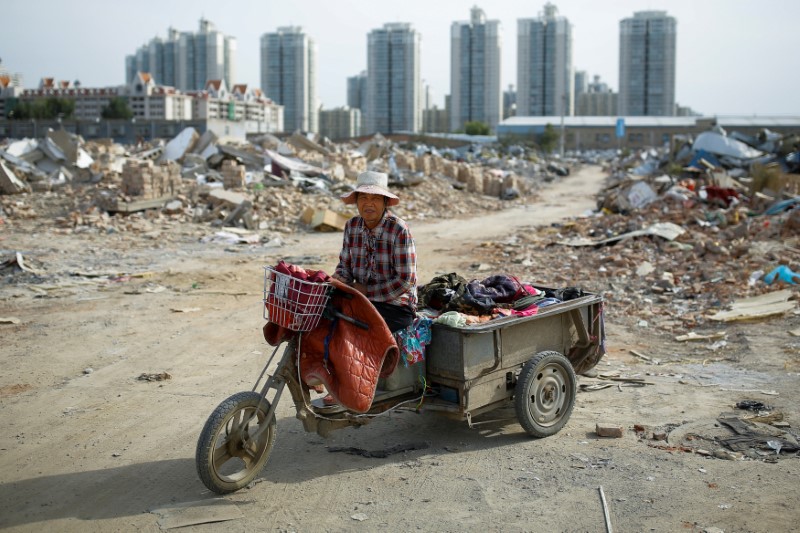By Elias Glenn and Natalie Thomas
BEIJING (Reuters) - Wang Qin, 59, collects scrap at a demolished residential district on the outskirts of Beijing, working 15 hours a day and struggling on her own to pay for her granddaughter's education.
She worries that her own home, a small illegally constructed shack where she lives with her granddaughter and mentally ill husband, might also be bulldozed by local authorities.
The family lives off the 1,500 yuan ($228) a month Wang makes selling scrap and receives no assistance from the Beijing government.
As migrants from another province, they are not recognized as residents of the capital despite having lived there since 2014. Since she is not registered in Beijing, Wang has to pay more for things like school and medical care - a hardship for migrants in cities, where costs such as housing are also far higher than in the countryside.
"Every month you still need to live, I still need to pay the school fees for the child, and her food and drink every day," said Wang, who came to Beijing to try escape the grinding poverty of her village in Henan province in central China. "I can't take it, my whole body aches, I can't earn the money."
Wang's plight is a common one among millions of poor migrants in China's big cities, as well as in the rural areas from which so many of them come, highlighting the challenges of the government's campaign to wipe out extreme poverty by 2020.
President Xi Jinping made the campaign one of his signature policy issues after pledging in 2015 that China would lift the 70 million people living under the poverty level at the time out of poverty by 2020.
The campaign has been ratcheted up as the Communist Party prepares to hold a twice-a-decade leadership meeting on Wednesday.
"The country is placing an unprecedented amount of effort on alleviating poverty," Liu Yongfu, head of the government's Leading Group of Poverty Alleviation and Development, said at a news conference in Beijing on Tuesday. "President Xi Jinping is personally in command, and has visited all of the areas of concentrated poverty" in China.
He added: "With the active participation of all parts of society, it can be said that the battle against poverty has achieved significant results."
Asked by Reuters about people like Wang, the scrap collector, Liu said migrants could receive benefits in their hometowns, noting that city dwellers were covered by urban social security programs.
Beijing has pledged to spend 86 billion yuan on poverty alleviation this year, 30 percent more than last year, according to the Ministry of Finance. Liu said direct spending by central and local governments on poverty alleviation from 2013 to 2017 totaled 461.2 billion yuan, adding that other types of government spending also had an impact.
The funds are used for infrastructure projects, as well as subsidies for education, health care and rural agriculture.
The government's poverty line is income of 2,300 yuan per year, and by the end of 2016, 43.35 million people were still officially below it. The government's goal is to lift 10 million out of poverty this year, and at that rate the country by 2020 should, at least officially, be rid of serious poverty.
The program is credited with increasing the attention given to the countryside and improving things like rural infrastructure.
The president of the World Bank, Jim Yong Kim, on Thursday said China's achievement in lifting 800 million people out of poverty since 1990 was "one of the great stories in human history".
But many researchers and social workers say the campaign doesn't address the most serious problems facing China's poor.
"I personally don't really agree with the government setting this 2020 poverty alleviation target," said Yang Lixiong, a professor at Renmin University in Beijing who has studied the issue. "The supportive policies can relieve poverty in the short term, but from a long-term perspective, they will easily fall back into poverty."
Yang said up to half the residents lifted from poverty in some western regions would slip back under the poverty line if government support was removed.
Yang said not enough attention was being paid to long-term issues such as access to schools and health care.
"Poverty can only be reduced over a very long period of time. And you can't say poverty is eliminated, it's impossible to eliminate," said Yang.
Central government officials acknowledge the challenges, which they say include poor implementation of policies and misuse of funds at the local level.
They also say the program is narrowly focused in order to address the most pressing problems of the poorest rural residents, but insist that much effort is going into improving health care and education.
"First we need to win this battle, resolve the current problems," said Liu, responding to a question from Reuters about whether the program would continue beyond 2020.
Wu Chen, founder of the Beijing-based Social Resources Institute, which works in Dalinggou, a village in Hebei province, said development of rural areas faced challenges like the emptying of the countryside as people move to cities looking for work, environmental destruction, and lack of capital.
Dalinggou is plastered with slogans calling for the village to win the war on poverty. With that aim in mind, the local government built a new paved road to the village and last month installed solar-powered street lights.
Wu said there had been a huge improvement in rural infrastructure, but a wide information and culture gap between the rural poor and urbanites remained a major challenge.
"Can these villagers not only escape poverty in terms of income, but also information and ability poverty?"

($1 = 6.5785 Chinese yuan renminbi)